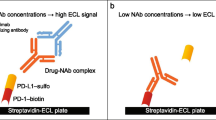Abstract
Therapeutic drug monitoring of TNF-alpha inhibitors is crucial for evaluating patients with inflammatory diseases on a personalized level. It has been clinically observed that many patients receiving TNF-alpha inhibitors, with negative drug and anti-drug antibody results from bridging ELISA (bELISA), lose their drug response over time, despite dose optimization. Our aims were to develop innovative in-house competitive ELISAs (cELISAs) for the detection of neutralizing antibodies against infliximab and adalimumab and compare their results to reporter gene assay (RGA) and in-house bELISA. Furthermore, we aimed to evaluate patient anti-drug antibody results in regard to their clinical records and potential benefits of therapeutic drug monitoring with the novel cELISAs. Sera of patients treated with infliximab (n = 46) or adalimumab (n = 31), having undetectable drug levels, were tested with our in-house cELISA. Briefly, samples were incubated with a fixed amount of drug and the neutralizing capacity of the samples was determined. The cELISA results were compared to RGA and bELISA results using Spearman’s correlation coefficient. Additionally, patient clinical data were evaluated in line with the results of cELISA, bELISA, and RGA using the Kaplan-Meier analysis and the Log Rank test. Both anti-infliximab and anti-adalimumab cELISAs showed very good correlation to RGA (r = 0.932, p < 0.0001 and r = 0.947, p < 0.0001, respectively). Furthermore, a positive result in anti-infliximab cELISA can predict treatment failure in 100% of patients with negative bELISA, while a positive result in anti-adalimumab cELISA can predict treatment failure in 80% of patients with negative bELISA. Taken together, we developed innovative cELISAs enabling quantification of functional and neutralizing anti-drug antibodies, comparable to RGA. The association between cELISA results and loss of drug response in patients identified clinically important anti-drug antibodies, as measured by cELISA.



Similar content being viewed by others
References
McInnes IB, Schett G (2011) The pathogenesis of rheumatoid arthritis. N Engl J Med 365(23):2205–2219. https://doi.org/10.1056/NEJMra1004965
Ambarus C, Yeremenko N, Tak PP, Baeten D (2012) Pathogenesis of spondyloarthritis: autoimmune or autoinflammatory? Curr Opin Rheumatol 24(4):351–358. https://doi.org/10.1097/BOR.0b013e3283534df4
Geremia A, Biancheri P, Allan P, Corazza GR, Di Sabatino A (2014) Innate and adaptive immunity in inflammatory bowel disease. Autoimmun Rev 13(1):3–10. https://doi.org/10.1016/j.autrev.2013.06.004
Smolen JS, Emery P (2011) Infliximab: 12 years of experience. Arthritis Res Ther 13(Suppl 1):S2. https://doi.org/10.1186/1478-6354-13-s1-s2
Anderson DL (2004) A new age in rheumatoid arthritis treatment. Am J Nurs 104(2):60–68
Tracey D, Klareskog L, Sasso EH, Salfeld JG, Tak PP (2008) Tumor necrosis factor antagonist mechanisms of action: a comprehensive review. Pharmacol Ther 117(2):244–279. https://doi.org/10.1016/j.pharmthera.2007.10.001
Roda G, Jharap B, Neeraj N, Colombel JF (2016) Loss of response to anti-TNFs: definition, epidemiology, and management. Clinical and Translational Gastroenterology 7:e135. https://doi.org/10.1038/ctg.2015.63
Canete JD, Hernandez MV, Sanmarti R (2017) Safety profile of biological therapies for treating rheumatoid arthritis. Expert Opin Biol Ther 17(9):1089–1103. https://doi.org/10.1080/14712598.2017.1346078
Detrez I, Van Stappen T, Martin Arranz MD, Papamichael K, Gils A (2017) Current practice for therapeutic drug monitoring of biopharmaceuticals in inflammatory bowel disease. Ther Drug Monit 39(4):344–349. https://doi.org/10.1097/ftd.0000000000000394
Hermans C, Herranz P, Segaert S, Gils A (2017) Current practice of therapeutic drug monitoring of biopharmaceuticals in psoriasis patients. Ther Drug Monit 39(4):356–359. https://doi.org/10.1097/ftd.0000000000000401
Medina F, Plasencia C, Goupille P, Ternant D, Balsa A, Mulleman D (2017) Current practice for therapeutic drug monitoring of biopharmaceuticals in rheumatoid arthritis. Ther Drug Monit 39(4):364–369. https://doi.org/10.1097/ftd.0000000000000421
Medina F, Plasencia C, Goupille P, Paintaud G, Balsa A, Mulleman D (2017) Current practice for therapeutic drug monitoring of biopharmaceuticals in spondyloarthritis. Ther Drug Monit 39(4):360–363. https://doi.org/10.1097/ftd.0000000000000400
Steenholdt C, Bendtzen K, Brynskov J, Thomsen OO, Ainsworth MA (2014) Clinical implications of measuring drug and anti-drug antibodies by different assays when optimizing infliximab treatment failure in Crohn’s disease: post hoc analysis of a randomized controlled trial. Am J Gastroenterol 109(7):1055–1064. https://doi.org/10.1038/ajg.2014.106
Mitrev N, Vande Casteele N, Seow CH, Andrews JM, Connor SJ, Moore GT, Barclay M, Begun J, Bryant R, Chan W, Corte C, Ghaly S, Lemberg DA, Kariyawasam V, Lewindon P, Martin J, Mountifield R, Radford-Smith G, Slobodian P, Sparrow M, Toong C, van Langenberg D, Ward MG, Leong RW (2017) Review article: consensus statements on therapeutic drug monitoring of anti-tumour necrosis factor therapy in inflammatory bowel diseases. Aliment Pharmacol Ther 46(11–12):1037–1053. https://doi.org/10.1111/apt.14368
Melmed GY, Irving PM, Jones J, Kaplan GG, Kozuch PL, Velayos FS, Baidoo L, Sparrow MP, Bressler B, Cheifetz AS, Devlin SM, Raffals LE, Vande Casteele N, Mould DR, Colombel JF, Dubinsky M, Sandborn WJ, Siegel CA (2016) Appropriateness of testing for anti-tumor necrosis factor agent and antibody concentrations, and interpretation of results. Clinical Gastroenterology and Hepatology: the Official Clinical Practice Journal of the American Gastroenterological Association 14(9):1302–1309. https://doi.org/10.1016/j.cgh.2016.05.010
Vande Casteele N, Feagan BG, Gils A, Vermeire S, Khanna R, Sandborn WJ, Levesque BG (2014) Therapeutic drug monitoring in inflammatory bowel disease: current state and future perspectives. Curr Gastroenterol Rep 16(4):378. https://doi.org/10.1007/s11894-014-0378-0
Vermeire S, Gils A (2013) Value of drug level testing and antibody assays in optimising biological therapy. Frontline Gastroenterol 4(1):41–43. https://doi.org/10.1136/flgastro-2012-100241
Ogric M, Tercelj M, Praprotnik S, Tomsic M, Bozic B, Sodin-Semrl S, Cucnik S (2017) Detection of adalimumab and anti-adalimumab antibodies in patients with rheumatoid arthritis: a comprehensive overview of methodology pitfalls and benefits. Immunol Res 65(1):172–185. https://doi.org/10.1007/s12026-016-8824-8
Lazar-Molnar E, Delgado JC (2016) Immunogenicity assessment of tumor necrosis factor antagonists in the clinical laboratory. Clin Chem 62(9):1186–1198. https://doi.org/10.1373/clinchem.2015.242875
Lallemand C, Kavrochorianou N, Steenholdt C, Bendtzen K, Ainsworth MA, Meritet JF, Blanchard B, Lebon P, Taylor P, Charles P, Alzabin S, Tovey MG (2011) Reporter gene assay for the quantification of the activity and neutralizing antibody response to TNFalpha antagonists. J Immunol Methods 373(1–2):229–239. https://doi.org/10.1016/j.jim.2011.08.022
Wang SL, Ohrmund L, Hauenstein S, Salbato J, Reddy R, Monk P, Lockton S, Ling N, Singh S (2012) Development and validation of a homogeneous mobility shift assay for the measurement of infliximab and antibodies-to-infliximab levels in patient serum. J Immunol Methods 382(1–2):177–188. https://doi.org/10.1016/j.jim.2012.06.002
Hock BD, Stamp LK, Hayman MW, Keating PE, Helms ET, Barclay ML (2016) Development of an ELISA-based competitive binding assay for the analysis of drug concentration and antidrug antibody levels in patients receiving adalimumab or infliximab. Ther Drug Monit 38(1):32–41. https://doi.org/10.1097/ftd.0000000000000229
Kosmac M, Avcin T, Toplak N, Simonini G, Cimaz R, Curin Serbec V (2011) Exploring the binding sites of anti-infliximab antibodies in pediatric patients with rheumatic diseases treated with infliximab. Pediatr Res 69(3):243–248. https://doi.org/10.1203/PDR.0b013e318208451d
Van Stappen T, Brouwers E, Tops S, Geukens N, Vermeire S, Declerck PJ, Gils A (2015) Generation of a highly specific monoclonal anti-infliximab antibody for harmonization of TNF-coated infliximab assays. Ther Drug Monit 37(4):479–485. https://doi.org/10.1097/ftd.0000000000000162
Bian S, Stappen TV, Baert F, Compernolle G, Brouwers E, Tops S, Vries A, Rispens T, Lammertyn J, Vermeire S, Gils A (2016) Generation and characterization of a unique panel of anti-adalimumab specific antibodies and their application in therapeutic drug monitoring assays. J Pharm Biomed Anal 125:62–67. https://doi.org/10.1016/j.jpba.2016.03.029
CLSI (2014) Evaluation of Precision of Quantitative Measurement Procedures; Approved Guideline – Third Edition. CLSI document EP05-A3. Clinical and Laboratory Standards Institute, Wayne
Van Stappen T, Billiet T, Vande Casteele N, Compernolle G, Brouwers E, Vermeire S, Gils A (2015) An optimized anti-infliximab bridging enzyme-linked immunosorbent assay for harmonization of anti-infliximab antibody titers in patients with inflammatory bowel diseases. Inflamm Bowel Dis 21(9):2172–2177. https://doi.org/10.1097/mib.0000000000000434
Gils A, Vande Casteele N, Poppe R, Van de Wouwer M, Compernolle G, Peeters M, Brouwers E, Vermeire S, Geukens N, Declerck PJ (2014) Development of a universal anti-adalimumab antibody standard for interlaboratory harmonization. Ther Drug Monit 36(5):669–673. https://doi.org/10.1097/ftd.0000000000000074
Calip GS, Adimadhyam S, Xing S, Rincon JC, Lee WJ, Anguiano RH (2017) Medication adherence and persistence over time with self-administered TNF-alpha inhibitors among young adult, middle-aged, and older patients with rheumatologic conditions. Semin Arthritis Rheum 47(2):157–164. https://doi.org/10.1016/j.semarthrit.2017.03.010
Darrouzain F, Bian S, Desvignes C, Bris C, Watier H, Paintaud G, de Vries A (2017) Immunoassays for measuring serum concentrations of monoclonal antibodies and anti-biopharmaceutical antibodies in patients. Ther Drug Monit 39(4):316–321. https://doi.org/10.1097/ftd.0000000000000419
Van Stappen T, Vande Casteele N, Van Assche G, Ferrante M, Vermeire S, Gils A (2018) Clinical relevance of detecting anti-infliximab antibodies with a drug-tolerant assay: post hoc analysis of the TAXIT trial. Gut 67(5):818–826. https://doi.org/10.1136/gutjnl-2016-313071
Acknowledgments
The authors would like to thank all the staff in the Department of Rheumatology and the Immunology Laboratory, who helped collect and process the patient samples.
Funding
The Slovenian Research Agency funded the National Research Program “Systemic Autoimmune Diseases” #P3-0314.
Author information
Authors and Affiliations
Contributions
All the authors have accepted responsibility for the entire content of this submitted manuscript and approved submission.
Corresponding author
Ethics declarations
Disclosures
None.
Ethical approval
This study was conducted as part of the National Research Program (#P3-0314) and has been approved by the National Medical Ethics Committee (#99/04/15 and #38/01/16). It has therefore been performed in accordance with the ethical standards laid down in 1964 Declaration of Helsinki and its later amendments. Informed consent was obtained from all individuals included in this study.
Disclaimer
No funding commercial organizations played a role in the study design; in the collection, analysis, and interpretation of data; in the writing of the report; or in the decision to submit the report for publication.
Additional information
Rheumatology in Slovenia: Clinical practice and translational research
Rights and permissions
About this article
Cite this article
Ogrič, M., Žigon, P., Lakota, K. et al. Clinically important neutralizing anti-drug antibodies detected with an in-house competitive ELISA. Clin Rheumatol 38, 361–370 (2019). https://doi.org/10.1007/s10067-018-4213-0
Received:
Accepted:
Published:
Issue Date:
DOI: https://doi.org/10.1007/s10067-018-4213-0




